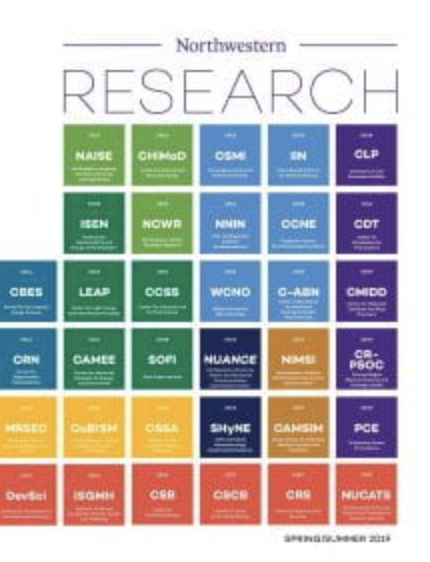A Network of Knowledge
 At Northwestern, interdisciplinary research is in our DNA, and our University Research Institutes and Centers (URICs) are a remarkable example of our commitment to breakthrough discovery at the convergence of knowledge domains.
At Northwestern, interdisciplinary research is in our DNA, and our University Research Institutes and Centers (URICs) are a remarkable example of our commitment to breakthrough discovery at the convergence of knowledge domains.
These institutes and centers bring together talent and ideas from across our schools to spur creative collaboration at the intersection of fields — from the life sciences and physical sciences to the social sciences and the arts and humanities. This magazine showcases some of the exceptional work catalyzed by our URICs, now numbering nearly 50, and suggests how they help set the tenor for Northwestern’s overall research enterprise.
Our University’s research has transformative impact, producing innovative advances that foster both deeper fundamental understandings and solve challenges to improve people’s lives and create a stronger society. We’ve designed our URICs ecosystem to support and encourage faculty, students, and postdoctoral fellows who seek to explore the possibilities of cross-disciplinary investigation.
Northwestern has long valued interdisciplinary research and was among the pioneers promoting it. In fact, our first URIC dates to 1948, with the founding of the Program of African Studies. Certainly, over the last two decades this approach has grown increasingly prominent within academia. But creating a culture that nurtures these complex efforts truly requires a “village.” It requires strategic vision and the partnership of a lot of people — notably our faculty, deans, and senior administrators, who are key to our ecosystem.
Those efforts have been rewarded, with the most important return on investment being the research outcomes themselves and the education that our students and postdocs receive at the intersection of traditional fields. That work is integral to Northwestern’s mission.
In tandem with those research outcomes, the URICs have helped attract new talent to our campuses: faculty, students, and postdocs who are excited about the possibilities of actively engaging colleagues from around this University to pursue answers to exciting and difficult questions. The URICs also have played an important part in the phenomenal research growth at Northwestern over the past 10 years or so, especially as government agencies have looked to fund more collaborative, interdisciplinary research — the kind of work that flourishes within the URICs and across our University. These exciting discoveries and the passion of those who make them possible inspire us each day at Northwestern. I hope the following pages make it abundantly clear why this is so!